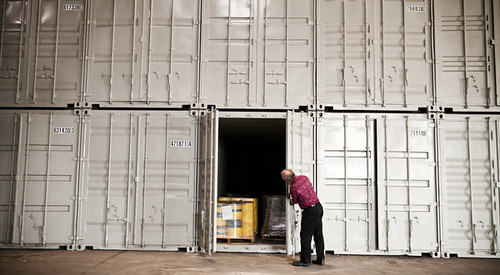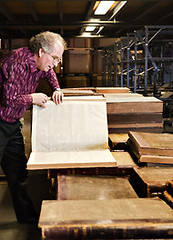
PREV ARTICLE
NEXT ARTICLE
FULL ISSUE
PREV FULL ISSUE
BREWSTER KAHLE'S ARK FULL OF BOOKS
The New York Times ran an article about Brewster Kahle's backup plan: a warehouse filled with real, actual, physical books.
-Editor
Forty-foot shipping containers stacked two by two are stuffed with the most enduring, as well as some of the most forgettable, books of the era. Every week, 20,000 new volumes arrive, many of them donations from libraries and universities thrilled to unload material that has no place in the Internet Age. Destined for immortality one day last week were “American Indian Policy in the 20th Century,” “All New Crafts for Halloween,” “The Portable Faulkner,” “What to Do When Your Son or Daughter Divorces” and “Temptation’s Kiss,” a romance. “We want to collect one copy of every book,” said Brewster Kahle, who has spent $3 million to buy and operate this repository situated just north of San Francisco. “You can never tell what is going to paint the portrait of a culture.” As society embraces all forms of digital entertainment, this latter-day Noah is looking the other way. A Silicon Valley entrepreneur who made his fortune selling a data-mining company to Amazon.com in 1999, Mr. Kahle founded and runs the Internet Archive, a nonprofit organization devoted to preserving Web pages — 150 billion so far — and making texts more widely available. But even though he started his archiving in the digital realm, he now wants to save physical texts, too. “We must keep the past even as we’re inventing a new future,” he said. “If the Library of Alexandria had made a copy of every book and sent it to India or China, we’d have the other works of Aristotle, the other plays of Euripides. One copy in one institution is not good enough.” Mr. Kahle had the idea for the physical archive while working on the Internet Archive, which has digitized two million books. With a deep dedication to traditional printing — one of his sons is named Caslon, after the 18th-century type designer — he abhorred the notion of throwing out a book once it had been scanned. The volume that yielded the digital copy was special. And perhaps essential. What if, for example, digitization improves and we need to copy the books again? “Microfilm and microfiche were once a utopian vision of access to all information,” Mr. Kahle noted, “but it turned out we were very glad we kept the books.”
I wonder how many numismatic books are in there?
-Editor

To read the complete article, see:
In a Flood Tide of Digital Data, an Ark Full of Books
(www.nytimes.com/2012/03/04/technology/internet The Numismatic Bibliomania Society is a non-profit organization promoting numismatic literature. See our web site at coinbooks.org. To submit items for publication in The E-Sylum, write to the Editor at this address: whomren@gmail.com To subscribe go to: https://my.binhost.com/lists/listinfo/esylum All Rights Reserved. NBS Home Page Contact the NBS webmaster 
|
